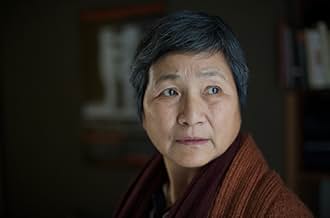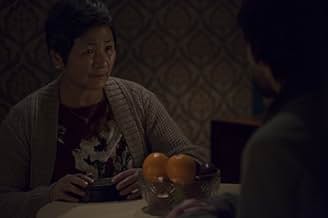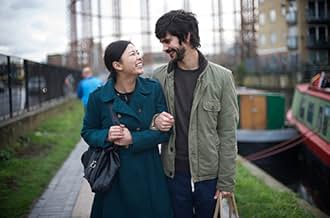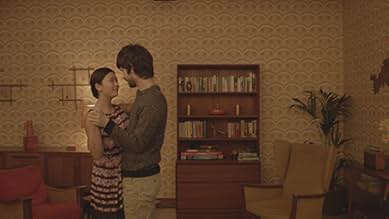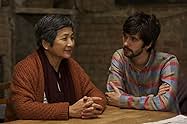Um jovem de ascendência sino-cambojana morre, deixando para trás sua mãe isolada e seu amante de 4 anos, que sofrem, mas não falam a língua um do outroUm jovem de ascendência sino-cambojana morre, deixando para trás sua mãe isolada e seu amante de 4 anos, que sofrem, mas não falam a língua um do outroUm jovem de ascendência sino-cambojana morre, deixando para trás sua mãe isolada e seu amante de 4 anos, que sofrem, mas não falam a língua um do outro
- Direção
- Roteirista
- Artistas
- Indicado para 1 prêmio BAFTA
- 4 vitórias e 7 indicações no total
- Junn
- (as Cheng Pei Pei)
- Vann
- (as Naomi Christie)
- Waiter
- (não creditado)
- Cafe customer
- (não creditado)
- Elderly Resident
- (não creditado)
- Café Customer
- (não creditado)
Avaliações em destaque
She relies on Kai's attentions and affections, but her isolation becomes utterly complete with his unfortunate death. Junn knew that Kai lived in a house with Richard (Ben Wishaw), but Kai hadn't told her they were together as a couple. Grief-stricken himself, Richard feels duty-bound to help Junn, but they don't even share a common language let alone know much about each other.
Alan (Peter Bowles) resides at the home too and starts an unusual relationship with Junn where they talk to each other in their own languages, not really knowing what on earth the other is thinking or talking about apart from physical gestures. Richard tries to help this sweet pairing by hiring a translator in Vann (Naomi Christie), so that they can communicate with each other. Its a way in for Richard to get closer to Junn, who has her own reasons for disliking him.
'Lilting' is the debut from writer-director Hong Khaou, who shines a light on contrasting cultures in the capital. Grief is foremost in the minds of all concerned, Wishaw is wonderful as the achingly suppressed Richard, who gradually releases his grief the more he gets to know Junn, showing her just how much he loved Kai. Pei Pei plays the stoic mother perfectly, you can see the isolation, love and grief in her eyes.
In light of the subject matter, the overall mood of 'Lilting' is quite forgiving. Junn and Alan provide the most endearing moments as well as some awkwardly comical scenes especially when they confess their bad habits to each other. Dealing with such weighty issues as love, memory, language and mourning, Khaou has directed an assured and thoughtful film full of subtle releases and deeply felt emotions.
"Lilting" is an ambitious attempt to portray the cultural differences at play in a modern relationship. The story places a lot of emphasis on the filial duties of a Chinese child, and the anger of the mother whose son does not fulfill the supposed filial duties. This is surely mystifying to Western viewers, and the film does not really explain it that clearly. As I do understand this cultural context, I empathise with the story.
Two things that bug me though, is that Kai looks so Caucasian. I have huge trouble in believing that he is only a quarter English. The second thing is that the mother says he feels lonely during Christmas, which is clearly a line aimed at Western viewers because she would the most likely not be celebrating Christmas. She would be way more likely to feel lonely during Chinese New Year.
Overall, "Lilting" is not for everyone. The pacing is slow, but if you understand the cultural subtext then you will empathise with the story a lot.
The movie has a really good start, but after halfway through, the Director/Writer loses his way; it seemed as if he's not sure as to where to take the story. By the time it ended, I felt dissatisfied; the story should have been longer or the characters should have been explored and developed a little more.
The two leads, Ben Whishaw and Pei-pei Cheng, give quite strong and incredible performances; they have a few immensely moving scenes. And it doesn't hurt that Andrew Leung, the actor playing the deceased partner, is quite handsome; he and Ben looked quite good together, which makes his death even more painful.
The conversations the two lead characters share are quite moving and thought-provoking, and the monologue Junn has towards the end on the essence of grief and crying is really beautiful. Let me quote the most effective lines from it: "These memories are all I have; I need to keep them vivid, or they'll fade like the face of my husband. I want to dwell on these memories and cry over them because they comfort me. Through plenty of crying, I've learnt to be content that I won't always be happy, secure in my loneliness, hopeful that I'll be able to cope."
The movie is depressing, yet uplifting, but somehow I feel, it failed to reach its true potential.
However Hong Khaou's film looks at the difficulties of communication at a much deeper level than the purely linguistic. He invites us to reflect on the wisdom of Kai's decision to put his mother in sheltered accommodation, whose dingy décor is designed to make elderly people 'feel better.' Despite Richard's basic kindness and his protestations of endless love for Kai, we wonder whether he actually understand what either Kai or Junn actually think. Maybe it's not really necessary to hire a translator: communication between individuals can take place at a subliminal level. Vann does her best to act as an intermediary between Junn and Richard, or Junn and Alan, but it's clear that her role is a peripheral one in the drama of familial relationships across cultures.
Shot in deliberately dark colors, LILTING depicts a world whose protagonists live in perpetual isolation, both literal as well as psychological. Junn's sheltered accommodation is both dark and prison-like; her fellow-residents seldom communicate except in clichés (Alan included). Richard's apartment is full of long, brick-lined passages; his kitchen is full of dirty cutlery, suggesting a fundamental inability to cope with life.
Our relationship with the two central protagonists is a complex one. Whishaw tries his best to render Richard a sympathetic character, but the more effort he makes to try and bridge the cultural differences separating himself from Junn, the more frustrated he becomes. His final outburst, where he accuses Junn of failing to "assimilate" to contemporary British cultures, is a classic colonialist statement, leaving us to reflect on why he himself did not do more to adapt himself to her mores. By contrast Junn remains both silent and serene; her final soliloquy reveals her determination to continue her existence, despite the prospect of future loneliness. She does not need to "assimilate"; she has found her own way to negotiate the culture she inhabits.
Modestly budgeted yet memorably staged by a director with an obvious affinity for the material, LILTING is an absorbing cinematic experience.
Você sabia?
- CuriosidadesFilmed in 3 weeks.
- Erros de gravaçãoAt the scene when Ben Whishaw and Andrew Leung were on bed, Ben says "You're really gonna do that?", but his lips don't move.
- Citações
Junn: Through plenty of crying, I've learnt to be content that I won't always be happy, secure in my loneliness, hopeful that I will be able to cope. Every year on Christmas Day I get very lonely. An incredible feeling of solitude. On this day, everything has stood still, even the trees have stopped rustling, but I'm still moving, I want to move, but I have nothing to move to, and nowhere to go. The scars beneath my skin suddenly surface and I get scared. Scared of being alone.
- ConexõesFeatured in Lilting: Deleted Scene (2014)
- Trilhas sonorasYe Lai Xiang
Performed by Xiang Lan Li
Principais escolhas
- How long is Lilting?Fornecido pela Alexa
Detalhes
- Data de lançamento
- País de origem
- Central de atendimento oficial
- Idiomas
- Também conhecido como
- Lilting
- Locações de filme
- Empresas de produção
- Consulte mais créditos da empresa na IMDbPro
Bilheteria
- Faturamento bruto nos EUA e Canadá
- US$ 27.054
- Fim de semana de estreia nos EUA e Canadá
- US$ 1.567
- 28 de set. de 2014
- Faturamento bruto mundial
- US$ 247.377
- Tempo de duração
- 1 h 23 min(83 min)
- Cor
- Proporção
- 2.35 : 1








